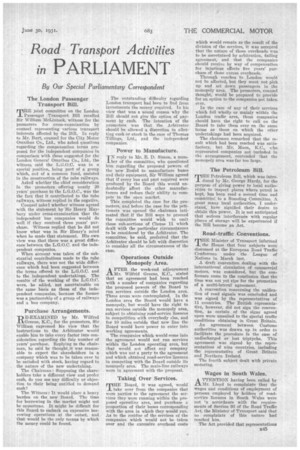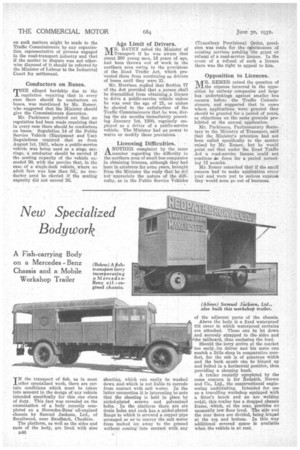Road Transport Activities
Page 63

Page 64

If you've noticed an error in this article please click here to report it so we can fix it.
in PARLIAMENT
By Our Special Parliamentary Correspondent
The London Passenger Transport Bill.
Tunjoint committee on the London Passenger Transport Bill recalled Sir William McLintoek, witness for the promoters for cross-examination by counsel representing various transport interests affected by the Bill, In reply to Mr. Burt, counsel for the City Motor Omnibus Co., Ltd., who asked questions regarding the compensation terms proposed for the independent companies in comparison with those suggested for the London General Omnibus Co., Ltd., the witness said the .L.G.O.C. was in a special position, being part of a group which, out of a common fund, assisted in the construction of the tube railways.
Asked whether the chief consideration in the promoters offering nearly 20 years purchase to the L.G.O.C., was the the fact that it contributed to the tube railways, witness replied in the negative.
Counsel asked whether witness agreed with the statement by Sir Henry Maybury under cross-examination that the independent bus companies would do well if they received three years' purchase. Witness replied that he did not know what was in Sir Henry's mind when he made that statement. His own view was that there was a great difference between the L.G.O.C. and the independent companies.
When account was taken of the substantial contributions made to the tube railways, there was not the wide difference which had been suggested between the terms offered to the L.G.O.C. and to the independent undertakings. The results of the working of the L.G.O.C. were, he added, not ascertainable on the same basis as those of the independent companies, because the former was a partnership of a group of railways and a bus company.
Purchase Arrangements.
RE-EXAMINED by Mr. Wilfred Greene, KG., for the promoters, Sir William expressed his view that the instructions to the Arbitrator would enable him to take every factor into consideratiou regarding the fair number of years' purchase. Replying to the chairman, he said he thonght,it was reasonable to expect the shareholders in a conipany which was to be taken over to be satisfied with stock, having regard to the nature of the new undertaking.
The Chairman: Supposing the shareholders take a different view and prefer cash, do you see any difficulty or objection to their being entitled to demand cask?
The Witness : It would place a heavy burden on the new Board. The time for borrowing in the market might not he opportune. It might be difficult for this Board to embark on expensive borrowing operations at the outset, and that would be the only means by which the money could be found. _The outstanding difficulty regarding London transport had been to find from investments the money required. In his view that was a sound reason why the Bill should not give the option of payment by cash. The intention of the promoters was that the Arbitrator should be allowed a discretion in allotting cash or stock in the case of Thomas Things, Ltd., and the independent companies.
Power to Manufacture.
IN reply to Mr. E. D. Simon, a member of the committee, who questioned him regarding the proposed powers of the new Bostrd to manufacture buses and their equipment, Sir William agreed that if every bus and part required were produced by the Board this would undoubtedly affect the other manufacturers and reduce their ability to compete in the open market.
This completed the case for the promoters, and before the case for the petitioners was opened the chairman intimated that if the Bill were to proceed the committee would wish to omit those sub-sections of Clause 11 which dealt with the particular circumstances to be considered by the Arbitrator. The committee, he said, preferred that the Arbitrator should be left with discretion to consider all the circumstances of the case.
Operations Outside Monopoly Area.
A FTER the week-end adjournment
Wilfrid Greene, K.C., stated that an agreement had been reached with a number of companies regarding the proposed powers of the Board to run services outside the London area. Three areas were contemplated. In the London area the Board would have a monopoly, but would have the right to run services outside the monopoly area, subject to obtaining road-service licences in competition with everybody else, and for 10 miles outside that new line the Board would have power to enter into working agreements.
The companies which would mine into the agreement would not run services within the London operating area, but that would not affect any company which was not a party to the agreement and which obtained road-service licences in competing with the Board outside its monopoly area. The main-line railways were in agreement with the proposal.
Taking Over Services.
THE Board, it was agreed, would take over from the companies that were patties to the agreement the services they were running within the proposed operating area, and purchase a proportion of their buses corresponding with the area in which they would rim. As to the residue of the services of the companies which would not be taken over and the excessive overhead costs which would remain as the result of the division of the services, it was accepted that the uature of those overheads was to be ascertained by arbitration, failing agreement, and that the companies should receive by way of compensation for injurious effects five years' purchase of those excess overheads.
Through coaches to Londou would not be affected, but they must not pick up and -set down passengers in the monopoly area. The promoters, counsel thought, would be prepared to provide for an option to the companies not taken over.
In the case of any of their services which fell wholly or mainly within the London traffic area, those companies should have the right to call on the Board to take them over on the same terms as those on which the other undertakings had been acquired.
The chairman remarked that the result which had been reached was satisfactory, but Mr. Moon, K.C., who represented companies not included in the arrangement, contended that the monopoly area was far too large.
The Petroleum Bill.
MIMI Petroleum Bill, which was intro.
(laced by Mr. George Hardy, for the purpose of giving power to local authorities to inspect places where petrol is kept, has been read a second time and committed to a Standing Committee. A. great many local authorities, I understand,' have signified their desire to obtain this power. It is not anticipated that serious interference with regular places of storage will be experienced if the Bill become an Act,
Road-traffic Conventions.
THE Minister of Transport informed the House that four subjects were discussed at the European Road Traffic Conference under the League of Nations in March last.
A draft convention dealing with the international circulation of commercial motors, was considered, but the conference came to the conclusion that the time was not yet ripe for the promotion of a multi-lateral agreement.
A convention -concerning the unification of road signals was concluded and was signed by the representatives of 11 countries. The British representative, however, did not sign the convention, as certain of the signs agreed upon were unsuited to the special traffic conditions obtaining in Great Britain.
An agreement between Customs authorities was drawn up in order to facilitate the procedure in the case of undischarged or lost triptychs. This agreement was signed by the representatives of nine countries, including the representative of Great Britain and Northern Ireland.
The subject dealt with private
mot
The subject dealt with private
mot Wages in South Wales.
ATTENTION having been called by Mr. Lloyd to complaints that the wages and conditions of employment of persons employed by holders of roadservice licences in South Wales were not in accordance with the requirements of Section 93 of the Road Traffic Act, the Minister of Transport said that no complaints of this nature had reached him.
The Act provided that representations
on such matters might be made to the Traffic Commissioners by any organization representative of persons engaged in the road-transport industry and that if the matter in dispute was not otherwise disposed of it should be referred by the Minister of Labour to the Industrial Court for settlement.
THE alleged hardship due to the regulation requiring that in every case there should be conductors on buses, was mentioned by Mr. Ramer, who suggested that the Minister should give the Commissioners discretion.
Mr. Parkinson pointed out that no regulation had been made requiring that in every case there should be conductors on buses. Regulation 14 of the Public Service Vehicle (Equipment and Use) Regulations required that as from August 1st, 1931, where a public-service vehicle was being used as a stage carriage, a conductor should be carried if the seating capacity of the vehicle exceeded 20, with the proviso that, in the case of a single-deck vehicle, where no adult fare was less than 6d. no conductor need be carried if the seating capacity did not exceed 26.
Conductors on. Buses. Age Limit of Drivers.
11-11. BATEY asked the Minister of —11.1.Transport if he was aware that about 200 young men, 18 years of age, had been thrown out of work in the northern area owing to the provisions of the ROad Traffic Act, which prevented them from continuing as drivers of buses until they were 21.
Mr. Morrison replied that Section 77 of the Act provided that a person shall be disqualified from obtaining,.a licence to drive a public-service vehicle unless he was over the age of 21, or unless he showed to the satisfaction of the Traffic Commissioners that he was, during the six months immediately preceding January 1st, 1930„ regularly employed as a driver of a public-service vehicle. The Minister had no power to waive or modify these provisions.
Licensing Difficulties.
ANOTHER complaint by the same member regarding the difficulty ill the northern area of small bus companies in obtaining licences, although they had been in existence for some years, brought from the Minister the reply that he did not "appreciate the nature of the difficulty, as in the Public Service Vehicles
(Transitory Provisions) Order, provision was made for the continuance of existing services pending the grant or refusal of a road-service licence. In the event of a refusal of such a licence there was the right to appeal to him.
Opposition to Licences.
R. ELMER raised the question of __Vithe expense incurred in the opposition by railway companies and large bus undertakings against smaller bus owners, before the Traffic Commissioners, and suggested that in cases where applications were granted they should he granted for a period of years, or objections on the same grounds prohibited at the annual application.
Mr. Parkinson, Parlianientary -Secretary to the Ministry of Transport, said that the Minister's attention had not been called specifically to the matter raised. by Mr. Realer,. but he would point out that under the Road Traffic Act a road-service 'lies= could net continue aèu force far a period exceed
ing 12 montha . • • •'
Mr. Rero.er remarked that if .the small owners had to make aPplidation .everY year and were put to serious expense they would soon go out of business.




































































































